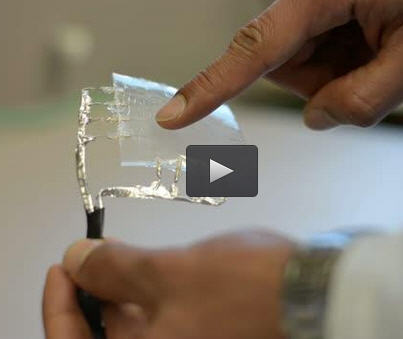New flexible sensor holds potential for foldable touch screens

There are sensors like the iPhone's 3-D Touch that can detect pressure, and some like Samsung's AirView that can detect a hovering finger. There are sensors that are foldable, transparent and stretchable. UBC researchers have developed a device that combines all those functions in one compact package -- the first stretchable touch sensor in Canada, and one that paves the way for foldable devices of the future. (Video) Credit: University of British Columbia
The sensor uses a highly conductive gel sandwiched between layers of silicone that can detect different types of touch, including swiping and tapping, even when it is stretched, folded or bent. This feature makes it suited for foldable devices of the future.
“There are sensors that can detect pressure, such as the iPhone's 3D Touch, and some that can detect a hovering finger, like Samsung's AirView. There are also sensors that are foldable, transparent and stretchable. Our contribution is a device that combines all those functions in one compact package,” said researcher Mirza Saquib Sarwar, a PhD student in electrical and computer engineering at UBC.
The prototype, described in a recent paper in Science Advances, measures 5 cm x 5 cm but could be easily scaled up as it uses inexpensive, widely available materials, including the gel and silicone.
“It's entirely possible to make a room-sized version of this sensor for just dollars per square metre, and then put sensors on the wall, on the floor, or over the surface of the body–almost anything that requires a transparent, stretchable touch screen,” said Sarwar. “And because it's cheap to manufacture, it could be embedded cost-effectively in disposable wearables like health monitors.”
The sensor could also be integrated in robotic “skins” to make human-robot interactions safer, added John Madden, Sarwar's supervisor and a professor in UBC's faculty of applied science.
“Currently, machines are kept separate from humans in the workplace because of the possibility that they could injure humans. If a robot could detect our presence and be 'soft' enough that they don't damage us during an interaction, we can safely exchange tools with them, they can pick up objects without damaging them, and they can safely probe their environment,” said Madden.
###
The research was funded by the Natural Sciences and Engineering Research Council of Canada.
Flickr album: https:/
Video: https:/
Media Contact
All latest news from the category: Information Technology
Here you can find a summary of innovations in the fields of information and data processing and up-to-date developments on IT equipment and hardware.
This area covers topics such as IT services, IT architectures, IT management and telecommunications.
Newest articles

Innovative vortex beam technology
…unleashes ultra-secure, high-capacity data transmission. Scientists have developed a breakthrough optical technology that could dramatically enhance the capacity and security of data transmission (Fig. 1). By utilizing a new type…

Tiny dancers: Scientists synchronise bacterial motion
Researchers at TU Delft have discovered that E. coli bacteria can synchronise their movements, creating order in seemingly random biological systems. By trapping individual bacteria in micro-engineered circular cavities and…

Primary investigation on ram-rotor detonation engine
Detonation is a supersonic combustion wave, characterized by a shock wave driven by the energy release from closely coupled chemical reactions. It is a typical form of pressure gain combustion,…



